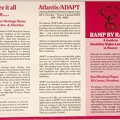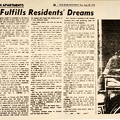This is the one side of a brochure called Ramp by Ramp. The other side is in ADAPT 35
In the center of the page on this side is a hand drawn map of downtown Denver, not to scale and only including the highlights listed here.
Below are the descriptions of the highlighted places:
[Headline] "Mapping the Denver Disability Movement's History"
[Subheading] McDonald's Restaurant
E. Colfax & Pennsylvania St.
This restaurant was built in 1985. It replaces an earlier inaccessible McDonald's, which was the first to be blocked by Atlantis activists in 1984. The furniture was bolted to the floor, restricting access for customers with disabilities. Wheelchair users were referred to the drive-up window. After blockades at McDonald's in seven cities, and many arrests for civil disobedience, restaurant officials agreed to develop access requirements so that all travelers could be assured of a meal and restroom. McDonald's also agreed to use disabled actors in their ads, a trend since adopted by many companies.
[Subheading] "Groundbreaking" Curb Cuts
E. Colfax & Colorado Blvd.
At this site in 1980, Atlantis protesters using wheelchairs swung sledgehammers to make way for needed curb ramps. City officials had refused to start planning for curb cuts, stating that it would be impossible to ramp all 44,000 curbs in Denver. Publicity from the sledgehammer action convinced officials to establish a curb cut program, and all Denver curbs are expected to be accessible by the year 1996.
[Subheading] Radisson Hotel
16th St. Mall/Tremont Pl.
This was the site of the first demonstration by ADAPT (American Disabled for Accessible Public Transit) in October 1983. The nation's transit officials were meeting at the hotel when disabled protesters blocked every entrance. Then Secretary of Transportation Elizabeth Dole, the keynote speaker, was forced to sneak in through a tunnel. During the next seven years, ADAPT continued to protest the policy of “local option," which allowed cities to offer separate, very limited van services, rather than to equip regular buses with lifts. ADAPT members disrupted meetings, blocked inaccessible buses, and committed other acts of civil disobedience for their cause; hundreds were arrested. These actions, and the national media exposure they gained, finally prompted the federal government to require lifts on all new buses.
[Subheading] Air Force Academy Chapel Colorado Springs
This most-visited tourist attraction on Colorado's front range became accessible only after Atlantis activists staged a “crawl-in" up the steps in 1986. The sight of hundreds of people trying to step over protesters created pressure to force the installation of an elevator in this tax-supported academy.
This brochure is dedicated to the memory of Wade and Lincoln Blank.
- Created on
- Wednesday 10 July 2013
- Posted on
- Friday 12 February 2016
- Tags
- Air Force Academy Chapel - Colorado Springs, curb cuts, Denver Disability History, Lincoln Blank, map, McDonald's, Radisson Hotel, Wade Blank
- Albums
- Visits
- 1637
- Rating score
- no rate
- Rate this photo


0 comments